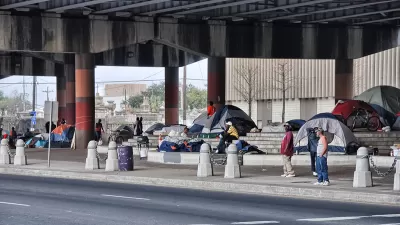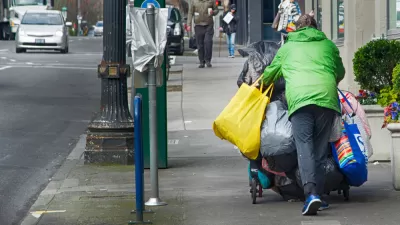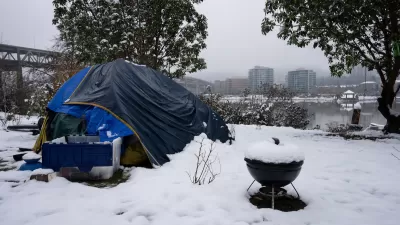An audit describes a number of issues with the city’s program to identify and remove illegal encampments.

The Portland, Oregon, homeless camp clean-up program is falling short in many ways, according to a recently released audit. The One Point of Contact system lets people report illegal campsites, but users say the response is too slow and they do not receive notification about action taken.
The audit also shows that prioritizing campsites, which is supposed to be part of the reporting system, is not happening and that many complaints are not being addressed, reports Gordon R. Friedman. "The week of June 4, 2018, for example, the city received 680 complaints about homeless camps but never followed up on them in 254 cases, auditors concluded."
Homeless people report that they are not given enough notice before clean-ups happen. They say that they do not have time to pack up and move and that belongings are hard to retrieve from the storage warehouse. "The city also did not store valuables such as IDs, credit cards and prescription medications separately from shelves full of blankets, tent parts and other property," writes Friedman.
Auditors found that Portland residents disagree about the clean-up effort, with some feeling that it is harassment and others arguing for even harsher action, such as the arrest of people in illegal campsites. City officials say they will make changes to the program based on the audit’s recommendations.
FULL STORY: Portland homeless camps clean-up program needs improving, auditors say

Alabama: Trump Terminates Settlements for Black Communities Harmed By Raw Sewage
Trump deemed the landmark civil rights agreement “illegal DEI and environmental justice policy.”

Study: Maui’s Plan to Convert Vacation Rentals to Long-Term Housing Could Cause Nearly $1 Billion Economic Loss
The plan would reduce visitor accommodation by 25% resulting in 1,900 jobs lost.

Planetizen Federal Action Tracker
A weekly monitor of how Trump’s orders and actions are impacting planners and planning in America.

Waymo Gets Permission to Map SF’s Market Street
If allowed to operate on the traffic-restricted street, Waymo’s autonomous taxis would have a leg up over ride-hailing competitors — and counter the city’s efforts to grow bike and pedestrian on the thoroughfare.

Parklet Symposium Highlights the Success of Shared Spaces
Parklets got a boost during the Covid-19 pandemic, when the concept was translated to outdoor dining programs that offered restaurants a lifeline during the shutdown.

Federal Homelessness Agency Places Entire Staff on Leave
The U.S. Interagency Council on Homelessness is the only federal agency dedicated to preventing and ending homelessness.
Urban Design for Planners 1: Software Tools
This six-course series explores essential urban design concepts using open source software and equips planners with the tools they need to participate fully in the urban design process.
Planning for Universal Design
Learn the tools for implementing Universal Design in planning regulations.
Caltrans
Smith Gee Studio
Institute for Housing and Urban Development Studies (IHS)
City of Grandview
Harvard GSD Executive Education
Toledo-Lucas County Plan Commissions
Salt Lake City
NYU Wagner Graduate School of Public Service





























